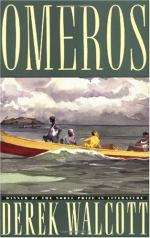|
This section contains 308 words (approx. 1 page at 400 words per page) |

|
Omeros Summary & Study Guide Description
Omeros Summary & Study Guide includes comprehensive information and analysis to help you understand the book. This study guide contains the following sections:
This detailed literature summary also contains Further Study on Omeros by Derek Walcott.
Publication of Omeros in 1990 signaled a milestone in the already remarkable career of Derek Walcott. This is not only because the author, who was born on the small Caribbean island of St. Lucia, went on to win the 1992 Nobel Prize for literature, but because his poem subtly undermines the very genre out of which it emerges.
Since Walcott himself voices reservations about the "heroic" dimensions of Omeros it is understandable that critics who are guided by textbook definitions have been reluctant to grant epic status to the poem. On one hand, Walcott's characters are unassuming peasants who fight no monumental battles; his persona/narrator is allowed no Olympic trappings; and on the other hand, the requisite narrative flow is occasionally disrupted by the poem's lyrical exuberance. Nevertheless, Omeros is not a literary parody. The title itself pays homage to Greek origins, deriving from the pronunciation of Homer's name. Walcott's poem has the length, the geographic scope, and enough recognizable variations on traditional epic ingredients to ensure comparison with the standard masterpieces.
Indeed, the essence of Walcott's contribution to the epic genre resides in the insights afforded by that comparison. Walcott revisits the canonical works of Homer, Virgil, Dante, Milton, Walt Whitman, James Joyce, and Hart Crane because they epitomize the ideals of Western civilization. Much as Walcott admires these predecessors, he also notes that the first four reflect a world of hegemonic domination or colonialism, dividing humanity into conqueror and conquered, or marginalized "other." Walcott's perspective is that of an artist who grew up in a neglected colony; he therefore asserts that the disenfranchised citizens of the world deserve their own validation. Whitman's Leaves of Grass, Joyce's Ulysses and Hart Crane's The Bridge, initiate the movement toward recognition of the common man. Omeros does nothing less than offer an alternative to the terms of classical heroism.
Read more from the Study Guide
|
This section contains 308 words (approx. 1 page at 400 words per page) |

|



